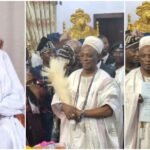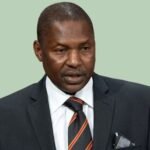Nnamdi Kanu, the leader of the proscribed Indigenous People of Biafra (IPOB), is once again at the center of Nigeria’s legal and political discourse. His ongoing trial, which resumed on March 21, 2025, marks a significant moment in the country’s handling of separatist movements and civil rights. Facing seven counts of terrorism and treason, Kanu’s case has been fraught with controversy, delays, and judicial recusals, making it one of the most closely watched trials in recent Nigerian history.
Background: Who is Nnamdi Kanu?
Nnamdi Kanu is a British-Nigerian political activist and the leader of IPOB, a group advocating for the secession of southeastern Nigeria to form an independent state of Biafra. His movement gained traction due to longstanding grievances among Igbo people, including claims of marginalization and lack of government representation.
Kanu first gained national attention through his online radio station, Radio Biafra, which was used to spread IPOB’s separatist message. His activities led to multiple arrests, with his most notable detention occurring in 2015. After spending nearly two years in custody, he was granted bail in 2017 but fled the country.
The Controversial Arrest and Trial
In June 2021, Kanu was controversially arrested and extradited from Kenya under circumstances that remain unclear. The Nigerian government has refused to disclose details, leading to allegations of an illegal abduction rather than a formal extradition.
Since then, his trial has been marred by several legal challenges:
Judicial Recusals: Kanu’s case has been reassigned to multiple judges, with the latest hearing taking place under a fourth judge. Several judges have stepped down due to threats, political pressure, or legal concerns.
Delayed Proceedings: The case has seen multiple adjournments, with the next hearings scheduled for April 29, May 2, and May 6, 2025.
Bail Applications: Kanu’s legal team has repeatedly sought bail on health and human rights grounds, but the courts have consistently denied these requests.
Government Stance vs. Public Perception
The Nigerian government maintains that Kanu’s actions amount to terrorism, citing IPOB’s alleged involvement in violent attacks across the southeast. Authorities argue that his rhetoric has incited unrest, leading to attacks on security forces and public infrastructure.
However, many supporters see Kanu as a political prisoner rather than a criminal. Human rights groups have criticized the government’s handling of the case, calling for a fair trial and due process. The legal proceedings have also fueled tensions between the Nigerian government and the Igbo population, who largely sympathize with Kanu’s cause, even if they do not support IPOB’s methods.
Implications for Nigeria’s Future
The outcome of Kanu’s trial will have significant implications for Nigeria’s unity and governance. If convicted, it may further inflame separatist tensions in the southeast, potentially leading to renewed protests and unrest. Conversely, if Kanu is released or acquitted, it could embolden separatist movements across the country, setting a precedent for other groups advocating for self-determination.
As the trial continues, the world watches to see how Nigeria will balance national security concerns with human rights and political freedoms. Whether justice is served or political tensions escalate, one thing is certain—this trial is shaping the course of Nigeria’s future.
If you enjoyed this article, click here to read more informative posts, also check us out on Instagram for fun and engaging content.
















